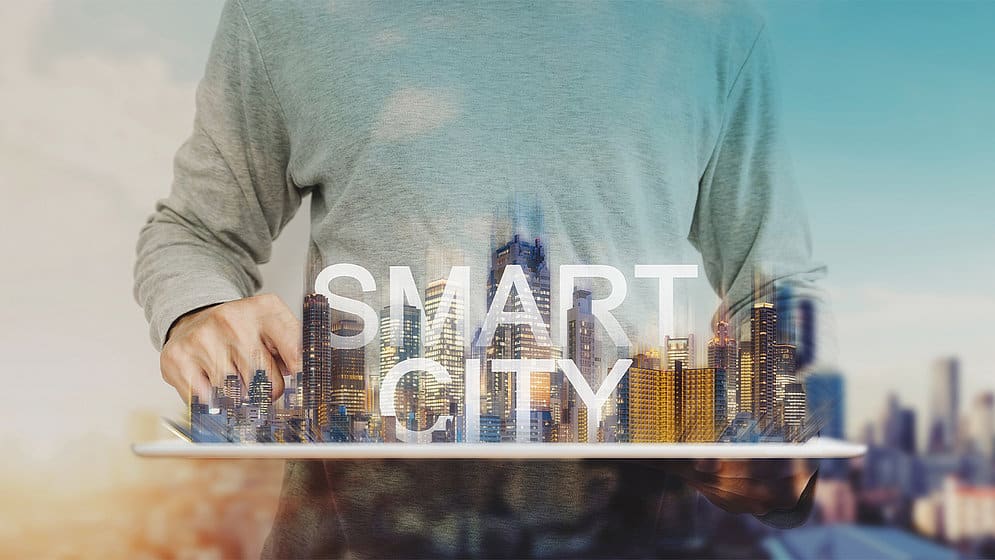Smart City Karlsruhe: tackling the challenges of our time with digitalization

Karlsruhe is considered a “smart city” because the city is pursuing holistic development concepts to make the fan-shaped city more efficient, technologically advanced and greener. But what does that mean? And what will this change for people in the city? Karlsruhe.digital deals with these questions and the digitalization of everyday life in a big city in the #smartcityKA series. To begin with, we will look at what smart actually means and how smart Karlsruhe is.
The two summers of drought in 2019 and 2020 have taken their toll on the city’s trees. And the extremely dry March 2022 also brought worry lines to the foreheads of those responsible at the forestry office and horticultural office. The city of Karlsruhe will not be able to change the weather in the future. However, the administration uses modern, networked and smart digital data analysis technology to respond to such events more efficiently and with fewer resources. In order to provide trees with an optimal supply of water during extreme weather conditions in future, sensors for measuring moisture will be installed on Friedrichsplatz. This allows the water supply of the trees in the root system to be recorded and the additional irrigation during dry periods to be controlled efficiently.
With projects such as “Smart Friedrichsplatz“, the horticultural department is now also set to benefit from digitalization. One aim is to provide the best possible protection for urban trees against the damaging effects of climate change such as drought and extreme precipitation. Another goal is the careful use of resources. Water can be saved by intelligently evaluating the data, as can personnel for the costly irrigation of urban greenery. And when the first results are available, systems for the intelligent irrigation of city trees will also be installed in other places in Karlsruhe.
Smart – A buzzword with meaning
Smart has something to do with digitalization and networking. Clear It has long been clear that digitalization is affecting all areas of life and that that this will also change the structure of our cities and municipalities.
In order to exploit the opportunities offered by information and networking technology for a sustainable and public welfare-oriented urban development, municipalities must remain liveable even under the new and changing conditions. Quality of life, participation and co-determination – not only in Germany, but also in other countries. worldwide, the question arises as to how our cities and municipalities will develop in the will develop in the age of digitalization.
Smart is therefore aimed at finding a resource-saving, needs-based solution to the central challenges of urban development and thus refers to the upgrading of cities and their infrastructures with digital technology and the linking of previously separate infrastructures or their subsystems. The Federal Institute for Research on Building, Urban Affairs and Spatial Development (BBSR) defines this as the modernization of municipal decision-making, planning and management processes with the involvement of citizens, private sector capital and the intensive use of data.
Smart cities are the cities of the future that will be characterized by new technologies and networking to improve the quality of life of their residents in the various areas or even increase them.
Smart City – Karlsruhe digitally networked
Intelligently networked, fast and modern: Karlsruhe is an established IT and science location and has also been working on its development as a smart city for some time. And with success, as the fan-shaped city is one of the most digital cities in Germany. This is shown, for example, by the 3rd place in the Smart City Award 2021 The digital association analyzes 81 major German cities every year in the categories of administration, IT and communication, energy and environment, mobility and society and recently placed Karlsruhe in third place behind Hamburg and Cologne, ahead of Munich and Darmstadt. In 2020, Karlsruhe won the title of “most digital administration”. Karlsruhe is also the only German city to be part of the G20 Global Smart Cities Alliance of the World Economic Forum (WEF).
In the important future field of energy and the environment, projects such as for example,“Smarter Friedrichsplatz” to additional points in the year-on-year and thus ensured the top position.
Cool Places on the Internet
Various sensors are currently being tested and validated in the Stadtwerke Karlsruhe demo lab. The sensor technology for the first test phase under real conditions is to be installed on several city trees in the green space on Erbprinzenstrasse as early as summer 2022. With the “Smart Friedrichsplatz” project and the use of sensors, the city of Karlsruhe is once again relying on digital solutions to combat urban heat islands. Densely populated urban areas in particular often experience above-average temperatures during the summer months. Because longer periods of heat stress people, animals and plants alike, the city has already put a map of cool places on the Internet. People in the city can seek and find refreshment in green spaces, under trees and by the water during particularly hot summer periods.
Data are made publicly available
The data from the Smart Friedrichsplatz project is to be processed transparently in future and made available to the public. The OK Lab Karlsruhe is developing a climate dashboard for this purpose, which can then also be accessed via the Karlsruhe app. A prototype of the dashboard can already be seen on the OK Lab website. The website is well worth a visit, as it also provides information on other climate protection projects run by the voluntary network, such as the Karlsruhe tree register and a map of direct marketing businesses in Karlsruhe.